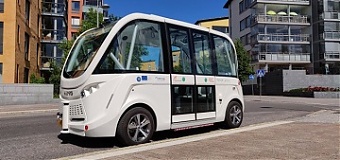Ecology, EU – Baltic States, Good for Business, Innovations, Latvia, Technology, Tourism, Transport
International Internet Magazine. Baltic States news & analytics
Friday, 02.01.2026, 14:49
Autonomus passenger bus to run in Jelgava and Aizkraukle for two weeks
 Print version
Print version |
|---|
The Sohjoa Baltic project's activities in Latvia mark a big step toward transition to autonomous transport, stressed Lujane.
In Jelgava, the autonomous bus will be running from August 14, connecting the entrance to Pasta Island and the reconstructed outdoor recreation area of the island. In Aizkraukle, the bus will be running from September 9, connecting Aizkraukle History and Art Museum and Lacplesa Street. In both Jelgava and Aizkraukle, the bus will operate for two weeks.
At the moment, the bus routes are being programmed in Jelgava, where the bus will use different sensors to comprehend and navigate the environment to know when to brake or stop completely. In the meantime, residents are advised to exercise caution and not try to create artificial obstacles for the bus, walk in front of the bus and suchlike. An assistant will be on the bus at all times who will take over driving the bus if necessary.
Lujane said that ZRP would continue implementation of similar projects in other Zemgale cities and towns in the future in cooperation with the Transport Ministry, Environmental Protection and Regional Development Ministry, and Road Traffic Safety Directorate.
Sohjoa Baltic researches, promotes and pilots automated driverless electric minibuses as part of the public transport chain, especially for the first/last mile connectivity. The project's total budget is EUR 3.8 mln, including Baltic Sea Region Interreg co-financing of EUR 2.8 mln. The project brings together partners from Finland, Estonia, Sweden, Latvia, Germany, Poland, Norway and Denmark.
- 28.01.2022 BONO aims at a billion!
- 26.08.2021 LLC Dizozols Investments finalizes investment attraction deal with Crowdestor with record-high profits
- 13.02.2021 Моя жизнь в газете. Очерки по новейшей истории Латвии. Глава 1
- 25.01.2021 Как банкиры 90-х делили «золотую милю» в Юрмале
- 30.12.2020 Накануне 25-летия Балтийский курс/The Baltic Course уходит с рынка деловых СМИ
- 30.12.2020 On the verge of its 25th anniversary, The Baltic Course leaves business media market
- 30.12.2020 Business Education Plus предлагает анонсы бизнес-обучений в январе-феврале 2021 года
- 30.12.2020 Hotels showing strong interest in providing self-isolation service
- 30.12.2020 EU to buy additional 100 mln doses of coronavirus vaccine
- 30.12.2020 ЕС закупит 100 млн. дополнительных доз вакцины Biontech и Pfizer








 «The Baltic Course» Is Sold and Stays in Business!
«The Baltic Course» Is Sold and Stays in Business!

